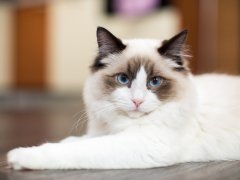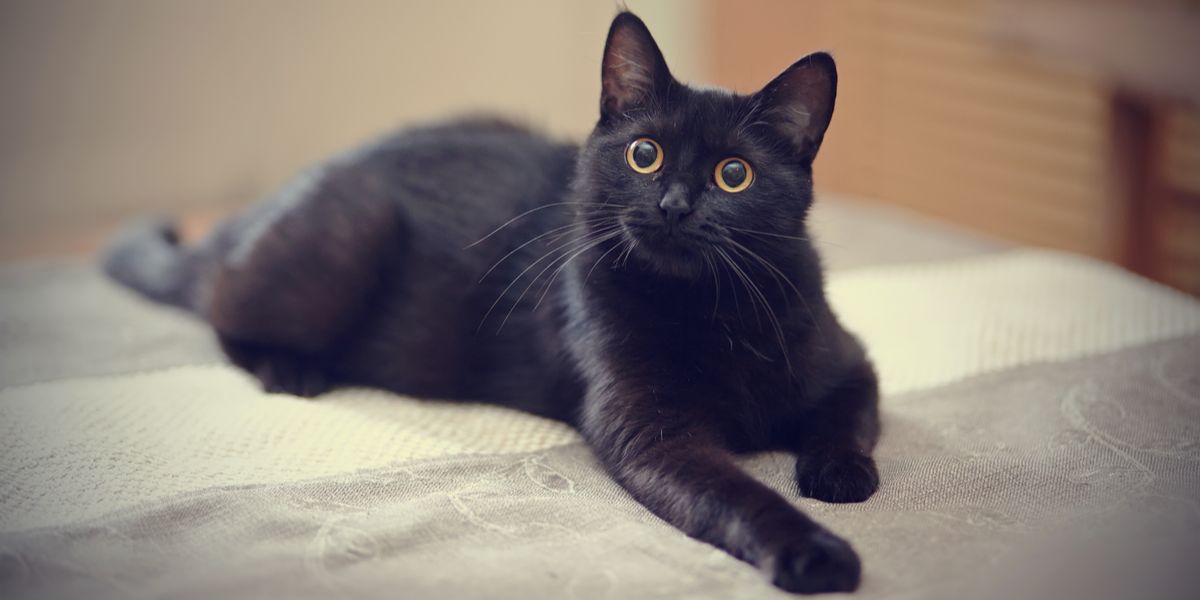
Sleek and beautiful, black cats often evoke thoughts of wild panthers or Halloween. Black is a dominant color, which means it is one of the most common colors found in cats.
Sadly, statistics suggest that black cats the least adoptable, with black cats languishing in animal shelters and rescue groups longer than other, more desirable colors. This could be due to the perceived “plainness” of the color or the fact that there are just many more black cats in general than cats of other colors.
One study examined this so-called “black cat bias” and found that people think cats with black coloring are less friendly and more aggressive than cats of other colors. The study also found that people are simply superstitious—black cats have a long history of being associated with bad luck, bad omens, and witchcraft.
Black cat lovers will tell you that all this is, of course, absolutely untrue. Forget about superstitions, black cats are not bad luck. In fact, many people believe that black is the most desirable of all the feline colors.
Black cats may be solid black, or black with white markings. Some solid black cats even have tabby or spotted markings, but it can be hard to see these unless the cat is in the right type of lighting (sunshine often puts phantom stripes or spots on display.
One cat breed only comes in black—the panther-esque Bombay cat. Many other popular cat breeds that come in a variety of colors come in black, whether solid or black with white markings. There are more than 20 different black cat breeds (most of these come in other colors too).
Some breeds never come in black, including the Abyssinian, Balinese, Burmese, Burmilla, Chartreux, Colorpoint Shorthair, Havana Brown, Egyptian Mau, Korat, Russian Blue, Somali, and Tonkinese.
A number of the pedigreed cat breeds recognized by the Cat Fanciers Association (CFA) and The International Cat Association (TICA) come in black. Read on to learn about some of the cat breeds that can be black.
Shorthair Cat Breeds
#1 Bombay
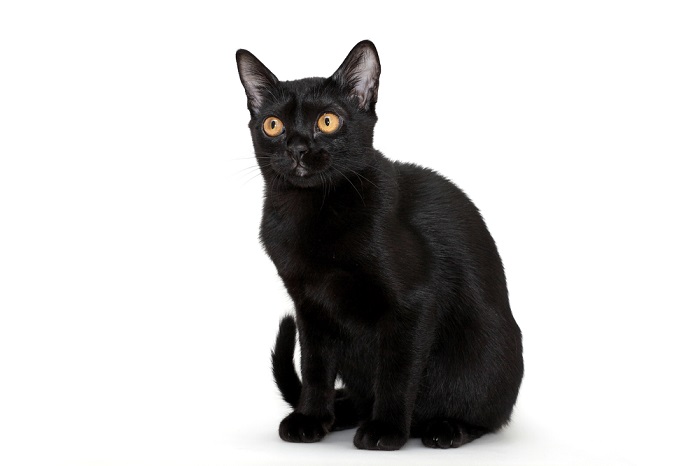
The Bombay is the only cat breed that is always black. The Bombay’s sleek, jet-black coat paired with its brilliant gold or copper eyes make this breed look just like a tiny panther. In fact, the breed creator, Nikki Horner of Louisville, Kentucky, sought out to create a cat that resembled a panther in miniature.
The Bombay’s early beginnings came from a cross breeding between a sable Burmese and a black American Shorthair. Many years later and with careful breeding, the Bombay was standardized. The Bombay is medium sized and muscular with a short coat. Solidly built, it feels heavy for its size. Bombays are affectionate, outgoing and playful and one of the only black cat breeds with yellow eyes.
#2 American Curl
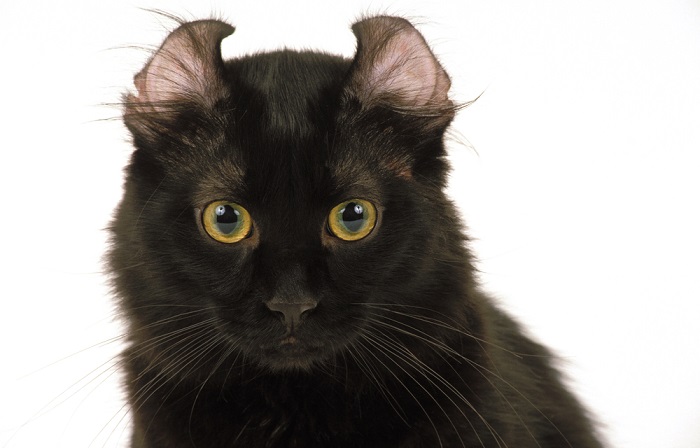
The American Curl is named for its unusual ears that curl backward, giving the cat a distinct look of surprise. The breed was created in the 1980s after a California couple took in a black longhaired stray cat with strange-looking ears.
That cat, named Shulamith, was the foundation for the American Curl breed. American Curl kittens are born with straight ears; they start the curling process when the kittens are between 3 and 5 days old. The ears vary in their amount of curl, with 90 to 180 degrees considered ideal.
American Curls may have longhair or shorthair, and come in a huge variety of colors and patterns, including solid black. This breed is rather small, with females weighing 5 to 8 pounds and males weighing 7 to 10 pounds. The American Curl is an alert, active, and gentle companion.
#3 Cornish Rex
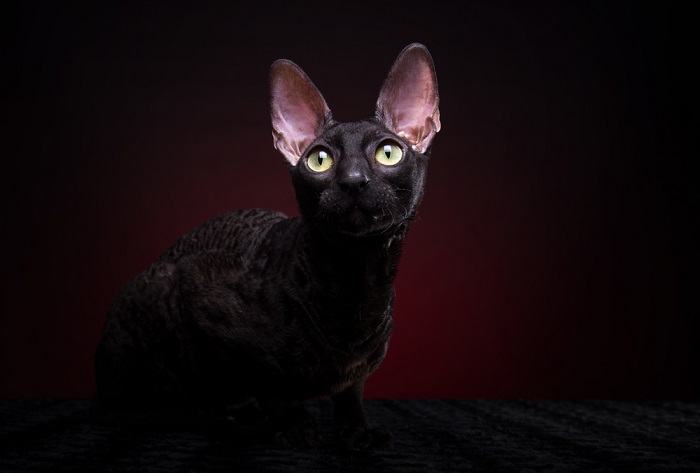
The Cornish Rex hails from Cornwall, England, where one curly-haired kitten was born into a litter of barn kittens in 1950. The curly coat and other physical characteristics, including bat ears and a whip-like tail, were the result of a spontaneous genetic mutation.
That kitten was bred back to his mother, and other breeds were later added to the mix, including Burmese, Siamese and mixed-breed domestic shorthaired cats. The Cornish Rex’s short, close-lying coat is soft and silky, with a uniform marcel wave.
The breed comes in many different colors and patterns, including solid black. The Cornish Rex is affectionate and active, remaining kitten-like long into adulthood.
#4 Devon Rex
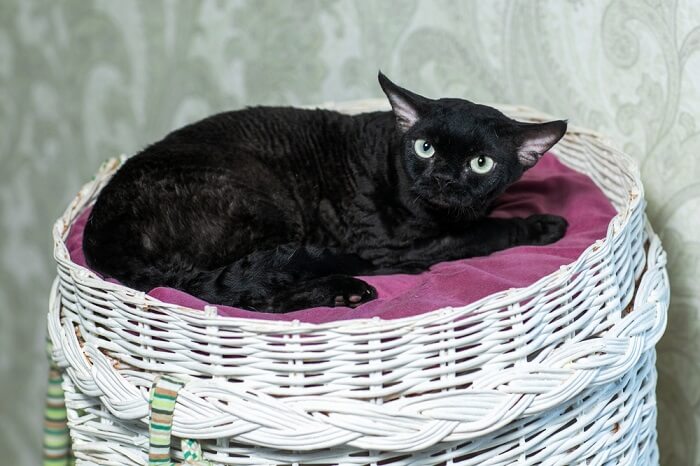
The Devon Rex is an adorable little cat that is sometimes called the “Elf cat” or “Pixie cat” thanks to its medium-fine frame, distinctive facial features (with large green eyes, a short muzzle and prominent cheekbones) and large ears that are rather low set.
The Devon Rex comes in almost every color and pattern imaginable, including solid black. The body is densely covered in a soft, fine, rexed coat that has a rippled wave effect. This sweet breed is playful, silly, and very dependent on human companionship.
#5 Exotic Shorthair
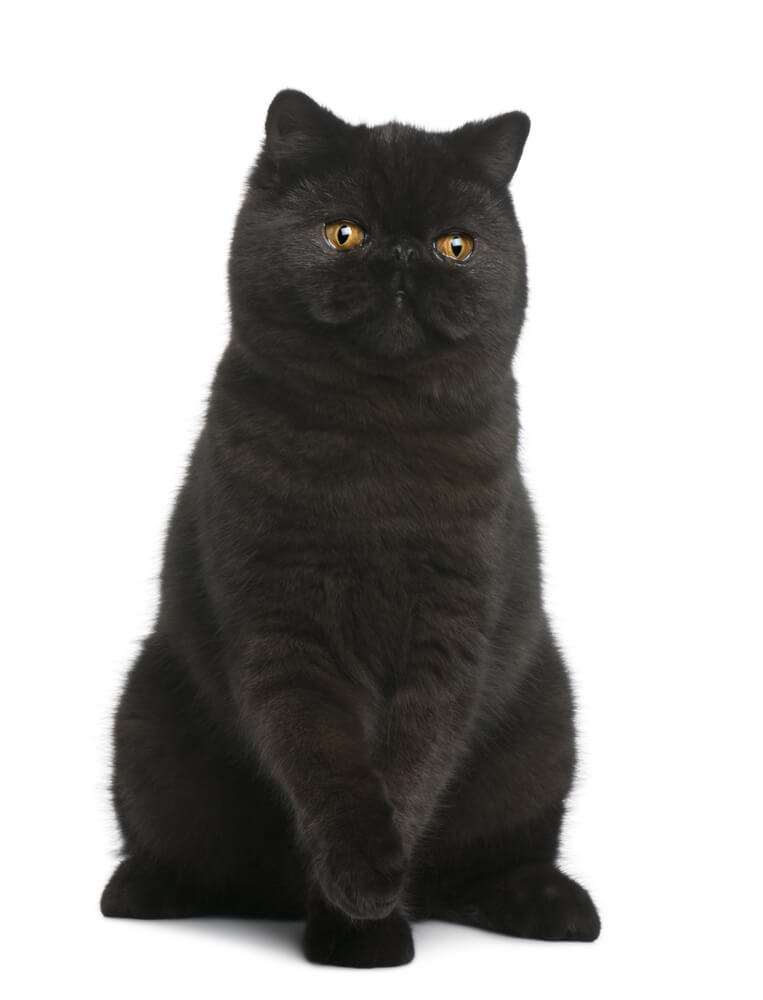
The Exotic Shorthair is a close cousin to the Persian cat. In fact, they two breeds are nearly identical aside from the Exotic’s short, plush coat, which makes this fluffy cat breed look like little teddy bears and is much easier to maintain than the Persian’s high-maintenance, profuse, long coat.
Like the Persian, Exotic Shorthair cats comes in a rainbow of patterns and colors, including solid black with brilliant copper eyes. The Exotic Shorthair’s personality is similar to the Persian’s—laidback, cuddly, gentle, and affectionate.
#6 Oriental Shorthair
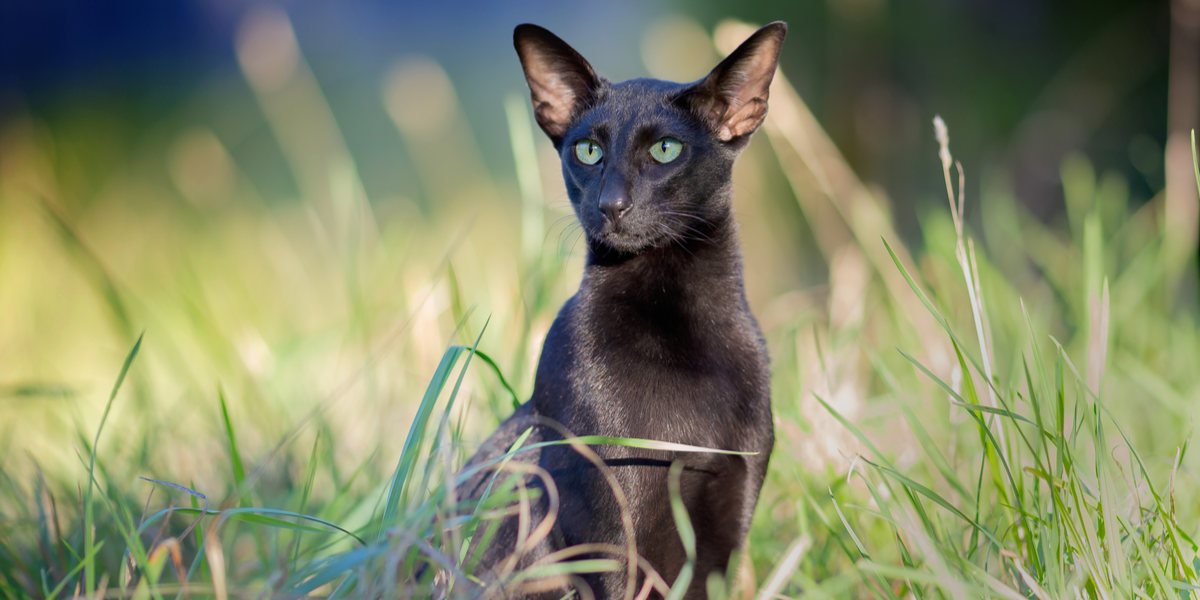
The Oriental Shorthair was developed in England in the 1950s when cat breeders experimented with crossing various breeds in the wake of World War II, which left purebred cats in low numbers.
Many different breeds were mixed with Siamese cats, including Abyssinians, British Shorthairs, Russian Blues, and even domestic mixed breed cats. When kittens born from these mixes were then crossed back with Siamese, breeders found themselves with a cat that look just like the Siamese in every way except color.
The Siamese is always pointed (a lighter-colored body with “points” of color on the head, legs and tail) and only comes in four colors: chocolate, seal, blue, and lilac. The Oriental, however, comes in more than 600 different color, pattern, and coat length combinations, including solid black. Oriental Shorthairs are great family pets, active, curious, and highly attached to its people.
#7 Sphynx
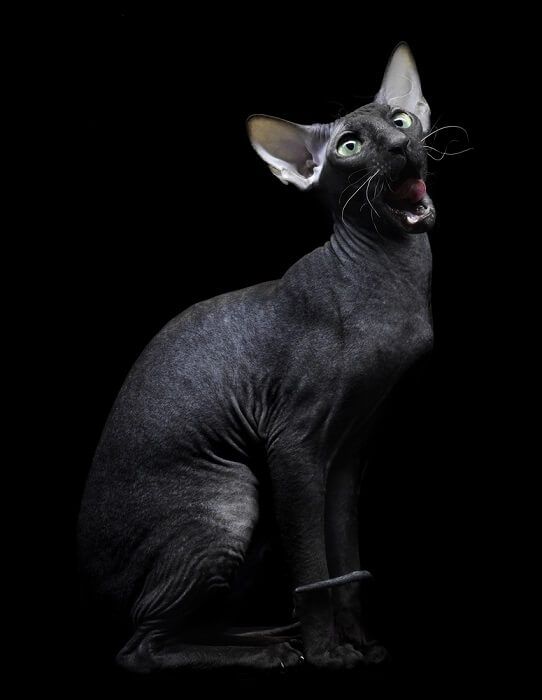
The hairless Sphynx may be any color and/or pattern, including black. You might wonder how a breed with no hair can come in different colors. Interestingly, Sphynx colors are determined by the color of the skin, as well as the color of any peach fuzz that may be present on the Sphynx’s body.
The Sphynx breed came to be when a hairless kitten was born into a litter of domestic cats in Toronto in the 1960s.
That kitten was hairless due to a spontaneous genetic mutation, which was then passed on to future generations of Sphynx. The Sphynx cat requires no brushing, but it must be bathed regularly to remove oils from the skin.
The breed loves to cuddle, and is reported to feel like a warm, purring water bottle.
Longhair Cat Breeds
#8 Maine Coon
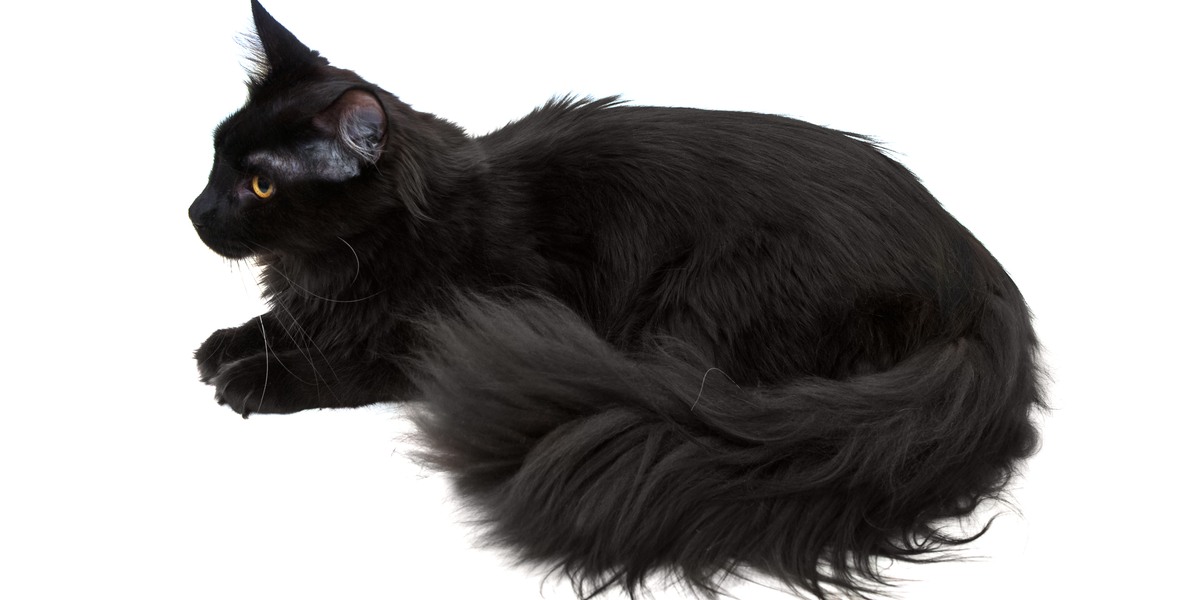
The Maine Coon is perhaps most recognized in its brown tabby coloration, but Maine Coons come in a wide variety of colors and patterns. A solid black Maine Coon, with its shaggy coat and abundant ruff on the chest, is incredibly striking. It’s also one of the largest black cat breeds on the plant.
The Maine Coon developed naturally in the forests of Maine, its thick, silky coat protecting it from the harsh Northeastern climate. This breed is a working cat through and through. Though the Maine Coon is a very large cat (it’s one of the largest cat breeds), the Maine Coon is well known as a gentle giant, getting along famously with adults, kids and other pets.
#9 Norwegian Forest Cat
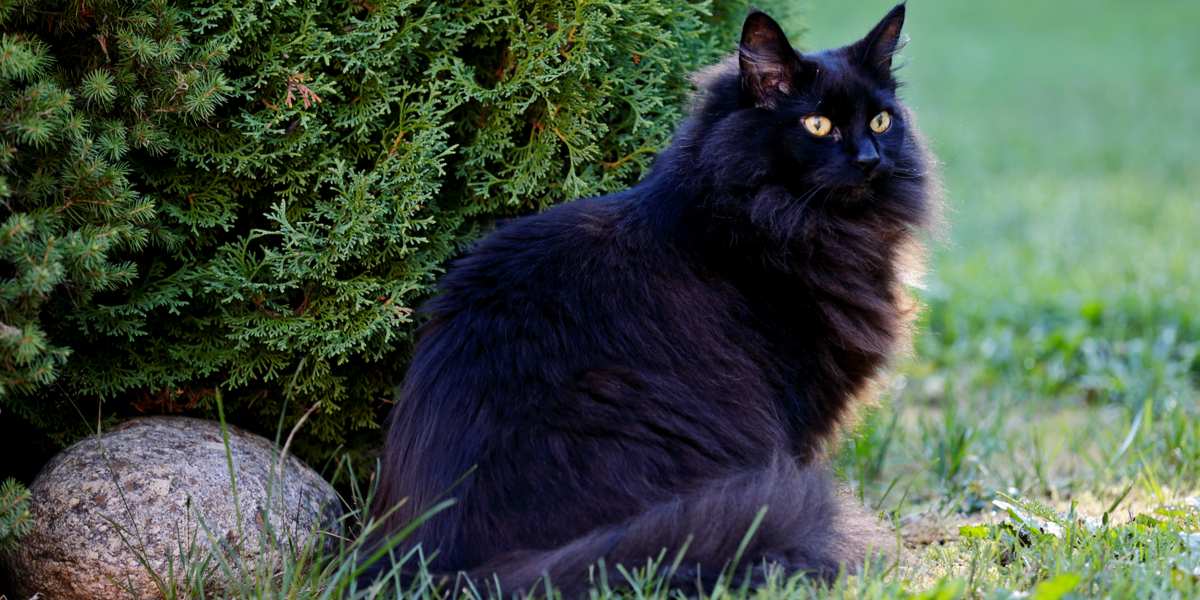
The Norwegian Forest Cat is a breed indigenous to Norway. If you like big fluffy cats, the Norwegian Forest Cat will be right up your alley. The breed’s dense, water proof double coat developed naturally and provided protection from the harsh winters.
The Norwegian Forest Cat comes in a large variety of colors and patterns, including black. The breed is fairly large; males average about 12 to 16 pounds, with females slightly smaller. The is friendly and gets along well with other pets, including other cats. They love their humans and want to be close by, but not necessarily on your lap.
#10 Persian
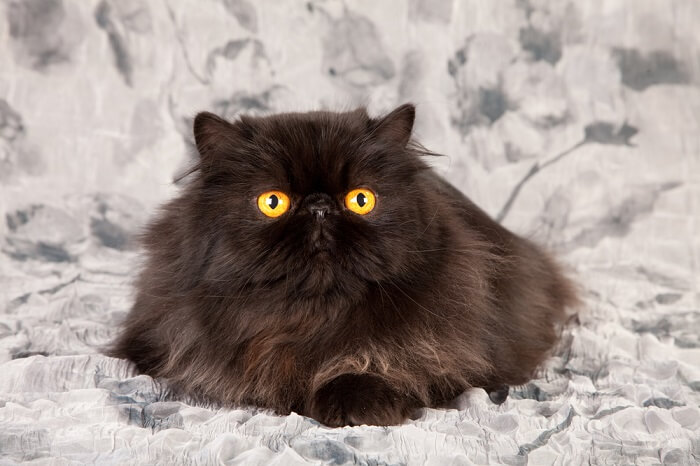
The Persian cat is one of the most ancient breeds. Though its exact history is not known for sure, Persian cats most likely originated in Persia and Iran. Hieroglyphics depicting longhaired cats resembling Persians date back as far as 1684 B.C.
The Persian is best known for its pushed-in “pansy” face and long, flowing coat, which come in many different shades, including black. Persian’s are exceptionally sweet, docile cats with mellow dispositions.
They are not very active, instead preferring to lounge, cuddle and be admired. The gorgeous, flowing coat is very thick. It needs daily brushing and combing to prevent mats, or can be shaved for less maintenance.


